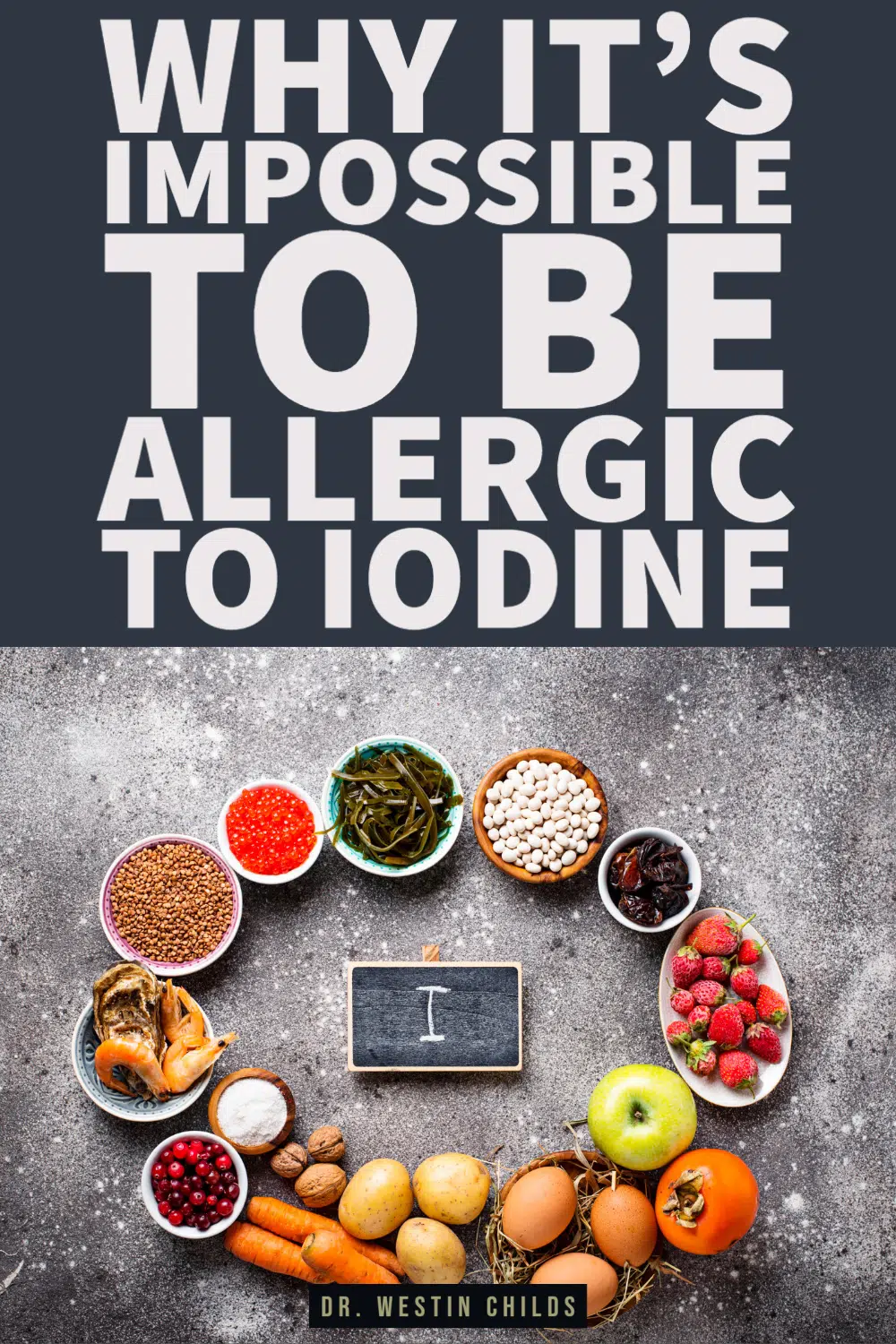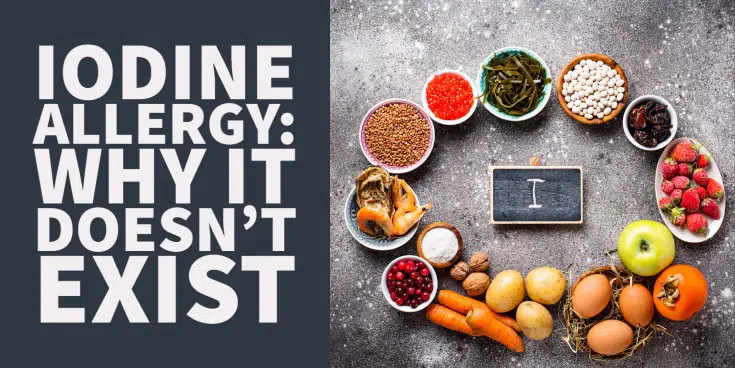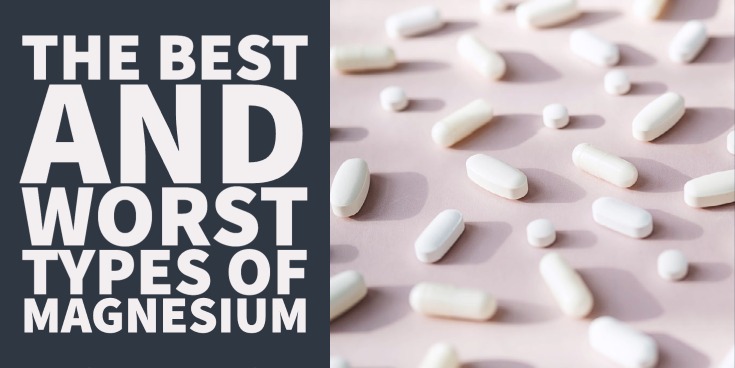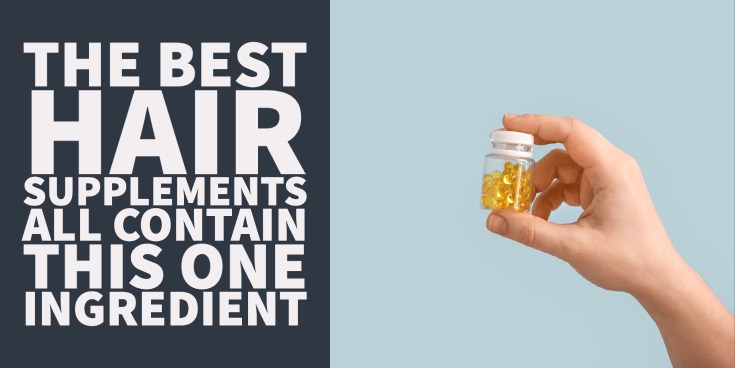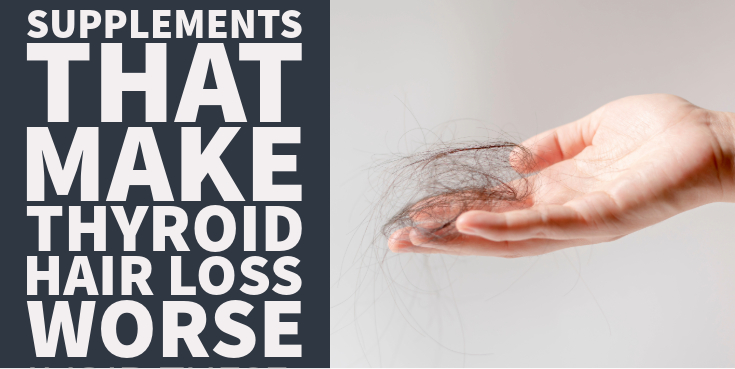I don’t think there’s a thyroid-related topic out there with more misinformation than iodine.
And this is especially true when discussing the topic of iodine allergy.
The truth is that a true iodine allergy doesn’t exist (1).
Before you run off screaming and yelling that you know for sure that you are allergic to iodine, hear me out.
Just because it’s not possible to be truly allergic to iodine doesn’t mean that you can’t experience a bad reaction when consuming iodine.
This distinction is very important.
The term allergy, when used in reference to medications, supplements, or foods, implies that your body simply can’t tolerate exposure to something.
Exposure to something that you are allergic to results in an immune response (2) that can range from mild itching to life-threatening conditions (3).
An allergic response is completely different from a negative reaction.
A negative reaction is just a set of symptoms that you may experience when taking a supplement or medication that doesn’t link directly to your immune system.
When it comes to iodine, most people who experience problems with iodine have negative reactions, not allergic reactions.
But because of misinformation, many of these patients are told they are allergic to iodine and then run around avoiding it like the plague.
This is a huge problem, though, because iodine is necessary for optimal thyroid function.
Complete avoidance of iodine increases your risk of developing thyroid conditions such as low thyroid function, Hashimoto’s thyroiditis, and other health problems (4).
Today, we are going to be discussing the idea of iodine allergy in detail.
Here’s what you will learn:
- Why it’s impossible to be allergic to iodine even if you’ve had a reaction to contrast dye
- How iodine gets into your body on a daily basis (sources that you probably aren’t aware of)
- What you are probably experiencing if you think that you are allergic to iodine
- The difference between an iodine allergy and negative reactions to iodine intake
- Symptoms that indicate you are having a negative reaction to iodine and what that means for your body
- What to do to ensure that you can take iodine safely to benefit your thyroid
- How much iodine you should be getting each and every day
Let’s jump in…
DOWNLOAD FREE RESOURCES
Foods to Avoid if you Have Thyroid Problems:
I’ve found that these 10 foods cause the most problems for thyroid patients. Learn which foods you should avoid if you have thyroid disease of any type.
The Complete List of Thyroid Lab tests:
The list includes optimal ranges, normal ranges, and the complete list of tests you need to diagnose and manage thyroid disease correctly!
3 Reasons You Can’t Be Allergic to Iodine
Before we talk about the main reasons why you can’t be allergic to iodine, we need to address where the concept of iodine allergy originates.
It is most often described in people who can’t tolerate iodinated contrast dye.
This type of dye is frequently used by radiologists before getting certain scans of the body to help identify structures within the body.
It has been noted that some people react with anaphylaxis when they are injected with this iodinated contrast dye (5).
Anaphylaxis is a potentially life-threatening reaction that occurs with exposure to something that you are allergic to.
This has led some doctors to believe that iodine was the principal cause of this allergy and thus the concept of iodine allergy was born.
To this day, people who have reactions to contrast dye will often be told that they are allergic to iodine and that they should avoid it 100%.
These same people then take this advice (6) to heart and avoid taking things (mostly supplements) out of fear that they will have the same reaction they had with exposure to the dye.
What they don’t realize, though, is that they may be sabotaging their own thyroid gland in the process.
The good news is that we now have more data and information which all suggest one thing:
A true iodine allergy is not possible.
The reason for this is explained in the following 3 sections:
#1. Iodine is Not Complex Enough to Trigger Antigenicity by the Immune System.
#1 sounds complex but it doesn’t have to be.
Let me break it down:
In order for something to actually cause an immune response in the body, that something must look complex enough to be identified by your immune system.
When we are talking about compounds in text or words, it’s easy to forget the size difference, at least at the molecular level, of these compounds.
For instance, even if we take something like sugar or protein, these two things are much more complex and much larger than an iodine molecule.
Remember:
Iodine is an element found on the periodic table of elements (7).
Yes, the body does require iodine, but you always have to remember just how tiny this element is in relation to proteins, carbohydrates, enzymes, and other things found inside the cell.
Some things are just so tiny and required by your cells that they go unnoticed by the immune system.
And for good reason.
You don’t really want your immune system to react to anything and everything that it comes into contact with.
Instead, you want to save those reactions for things that matter such as viruses, bacteria, and parasites.
We know from our study of the immune system, that iodine is just not complex enough by itself to trigger an allergic reaction from the immune system.
For this reason, supplements that contain purely iodine are quite safe.
But what about cases where iodine is bound or complexed to something else?
This sort of thing does increase the complexity of the compound and may now allow for a reaction by the immune system.
Things that attach to compounds and make them antigenic are called haptens (8).

When a hapten is bound to something much larger and more complex you may then be able to get a response from the immune system.
This exact mechanism is used in vaccines (9).
Because most antigens placed in vaccines are too small and not complex enough to elicit an immune response, they are bound to carriers that stir up the immune system.
And it is often the carriers in vaccines that cause the issues people experience post-vaccination (not the haptens themselves)!
If you ever want to take a look at vaccine-related side effects, you can check out this page (10).
How does this idea of haptens play into iodine allergy?
In the case of iodinated contrast dye, it is highly likely that iodine plays the role of a hapten where it actually causes no issues by itself.
When iodine is bound to other compounds in the dye, those compounds then become complex enough to elicit an immune response.
But it isn’t the iodine causing it! It’s the compound that it is bound to.
#2. Iodine is Required to Sustain Life and Can’t Be Created by the Body.
From a logical perspective, it doesn’t make any sense that the body would even be capable of being allergic to iodine.
It’s about the same thing as suggesting that someone could be allergic to air.
How can you be allergic to something that is required for life?
While avoiding iodine for a few minutes won’t lead to death, it can lead to death if completely avoided for an extended period of time.
Here’s how:
Iodine is required by your body to build thyroid hormone (11).
Thyroid hormone is required by the body for many important functions inside of your cells, notably related to metabolism, enzyme production, and protein production.
If you don’t have iodine then you don’t have the necessary building blocks to produce thyroid hormone.
If you don’t produce thyroid hormone you will start to experience low thyroid symptoms.
As thyroid hormone declines in your body, you will eventually reach a point where you will enter into what’s called myxedema coma (12) which can result in death if not treated.
This obviously doesn’t happen in modern times because we identify the lack of thyroid hormone very quickly!
Furthermore, the body is not capable of producing iodine on its own!
The only way for you to get iodine is to consume it either through the foods that you eat or through the supplements that you take.
There is one other way to get iodine, which we will talk about below, and that is through the skin.
It doesn’t make sense at all that the body would be capable of being allergic to something that it can’t create on its own and that is required for life.
#3. Iodine is in All Sorts of Foods and Products That You are Probably Consuming Every Day.
Lastly, if you are going to claim that you are allergic to iodine or that you have anaphylaxis when you consume iodine supplements, then you have to explain why you aren’t dying when you eat any of the following foods:
- Milk (1 cup contains up to 94mcg of iodine)
- Cod (3 oz contains up to 99mcg of iodine)
- Iodized salt (1.5 grams contains up to 71mcg of iodine)
- Shrimp 3oz contains up to 35mcg of iodine)
- Tuna (3oz contains up to 17mcg of iodine)
- Eggs (1 large egg contains up to 24mcg of iodine)
- Turkey breast (2.5 ounces contains up to 30mcg of iodine)
- Prunes (5 prunes contain up to 13mcg of iodine)
- Lima beans (1/2 cup contains up to 8mcg of iodine)
- Yogurt (1 cup contains up to 74mcg of iodine)
- Bananas (1 banana contains up to 3mcg of iodine)
- Strawberries (1 cup contains up to 13 mcg of iodine)
For context, the average person needs to consume anywhere between 150 to 250mcg of iodine each and every day.
These foods ALL contain various concentrations of iodine and they are probably foods that you are consuming on a day-to-day basis.
If you are someone who believes that you are allergic to iodine then you have to explain why you aren’t experiencing an allergic reaction when you eat these foods.
The same is true for those people who experience negative reactions to iodine intake.
How is it that you can consume iodine from foods and not have issues but experience problems when consuming iodine from other sources?
We will explain why that can occur in a little bit, but before we do we need to talk about other hidden sources of iodine.
Not only does iodine hide in all sorts of foods, it also hides in other places that you probably didn’t realize.
Some of these include:
- Cosmetic products – Cosmetic products contain iodine-containing-ingredients such as ammonium iodide, PVP, SSKI, sodium iodide, and polyvinylpyrrolidone. These ingredients can be absorbed through the skin and make their way into your body.
- Iodized salt – Many types of salts are fortified with iodine which means that salt may be a source of iodine exposure.
- Certain ingredients in supplements – Lastly, iodine can hide in whole ingredients including things like seaweed, thyroid glandulars, dulse, and bladderwrack. Even though iodine is found in these ingredients it may not show up as iodine on the supplement fact panel on the back of your bottle.
Before you suggest that you have an iodine allergy, make sure that you take stock of all of the potential ways that iodine can make it into your body.
If you are accidentally consuming iodine from these sources and not experiencing a reaction then there’s a good chance that you aren’t allergic to iodine.
Negative Reactions to Iodine Can and Do Occur
I know what you’re thinking:
If it’s impossible to have an allergic reaction to iodine then how can you explain why I experience certain symptoms when I take iodine?
It turns out that some people do experience negative reactions when they take iodine.
For clarity, I will refer to these reactions as negative side effects or negative reactions to iodine exposure.
What is most important to understand about these reactions is that they are not the same thing as an iodine allergy.
Having said that, consuming iodine can lead to some problems and symptoms which can be explained.
If you’ve taken iodine in the past and experienced a bad reaction, it is likely due to one or more of the following causes:
- Thyroid problems – Because iodine is required for thyroid hormone production, it makes sense that taking iodine can impact your thyroid hormone levels! Taking too much iodine (or not consuming enough) can impact how much thyroid hormone your body creates. Symptoms related to iodine intake may actually be caused by changes to circulating thyroid hormone levels. In this way, iodine intake results in changes to thyroid hormone levels (13) which then result in specific symptoms depending on whether you have high or low thyroid function. You can see a list of high thyroid symptoms here and a list of low thyroid symptoms here to see where you fit on this spectrum. Please note, however, that most of the time taking iodine has no real impact on thyroid function, and people who take it notice no perceptible difference in how they feel.
- Hyperthyroidism – Taking high doses of iodine is usually well tolerated by most people but in certain susceptible individuals, it may trigger hyperthyroidism. There is even evidence to suggest that high doses of iodine may increase your risk of developing autoimmune hyperthyroidism. Again, this is not very common but it can occur rarely.
- Hashimoto’s Thyroiditis – Constant exposure to high doses of iodine may also trigger Hashimoto’s thyroiditis (autoimmune hypothyroidism). Those people who develop Hashimoto’s secondary to iodine intake usually have many other underlying issues that trigger the disease state. In other words, it’s hard to pin down iodine as the primary cause even though it may have been the “straw that broke the camel’s back” so to speak. Again, this is not very common but it can happen rarely.
- Halogenoderma – Sometimes taking iodine may result in acne-like pustules that develop on the face or other places of the body. This is known as halogenoderma (14). People who experience this symptom will often say that they experienced acne when they took iodine but that isn’t really true. Even though this condition is similar to acne, it’s not actually the same thing and is felt to be related to halogens that are inside the body. When iodine is consumed it either kicks up an immune response in the skin which results in pustules or it results in the elimination of the halogens through the skin. We aren’t sure which one it is but we know it’s not acne.
- Improper dosing of iodine (usually too much) – Iodine, while important, is a Goldilocks sort of thing. In other words, you don’t want too much and you don’t want too little, you need just the right amount. Because of the prevalence of thyroid disease and that many thyroid patients are undertreated, some patients try to take control of their thyroid in any way that they can. I’ve seen thyroid patients use incredibly high doses of iodine which the body was never intended to be subjected to. These massive doses of iodine have the potential to cause problems in some individuals. For reference, these doses often exceed 25mg or more of iodine taken each day. The recommended RDA of iodine intake is somewhere around 150 to 250 mcg per day which means that these doses are as high as 100 times that of what you should normally take.
Even though these conditions can occur when using iodine, they are actually not that common.
In addition, taking iodine in the right way (at the right dose) and with the right protective nutrients (such as selenium), essentially eliminates these side effects.
Remember:
Your body was created (or evolved, depending on how you think about it) to use iodine without any issues.
The system would be set up pretty poorly if your body wasn’t actually able to use it correctly.
For most people, it uses it correctly without any issues.
People who experience negative reactions to iodine consumption often have other underlying issues which then come to a head with iodine intake.
But it’s not the iodine’s fault, per se, it’s really those underlying issues that are the problem.
Symptoms of Iodine Reactions
Now that we’ve discussed how iodine can cause problems, let’s talk a little bit more about what that looks like to you as a patient.
In other words, how do you know if taking iodine is a problem in your body?
The good news is that it’s actually fairly easy because your body will let you know.
If you experience a negative reaction to iodine you may experience any or all of the following symptoms:
- Acne-like pustules
- Racing heart
- Sweating
- Headaches
- Fatigue
- Changes to your weight
- Nausea
- Stomach pain
- Metallic taste in the mouth
- Joint pain or muscle pain
- Changes to your hair, skin, or nails
- Thyroid gland pain
- Swelling in the neck
- Other symptoms of hyperthyroidism
- Other symptoms of hypothyroidism
The symptoms just listed above stem from the intake of iodine into your body and subsequent effects that can occur related to that.
These include changes to thyroid function, detoxification of halogens from the body (or immune reactions to halogens), and changes to immune function.
These symptoms are NOT from allergies to iodine but instead due to physiologic changes incurred from iodine intake.
For reference, the symptoms associated with a true allergy to radioactive iodinated contrast dye and iodine-containing antiseptics (15) (rarely) include:
- Itchiness
- Redness
- Hives
- Flushing
- Sneezing
- Fever
- Angioedema
- Anaphylaxis
- Stevens-Johnson syndrome
- Toxic epidermal necrolysis
Please note that these symptoms are included for completeness’ sake.
Remember:
These symptoms are not related to a true iodine allergy but instead due to elements in the iodinated contrast dye.
Just because you’ve experienced these symptoms when exposed to iodinated contrast dye does NOT mean that you are allergic to iodine or will experience them again if you consume iodine.
I know I’ve hammered this point several times but it’s important to understand the distinction.
Your Next Steps If You Think You Have an Iodine Allergy
The good news is that a true allergy to iodine doesn’t exist.
The bad news is that, even though this is the case, some people still have bad reactions to iodine.
What are you supposed to do if you fit into that category?
There are several steps that you can take to fix this problem.
Taking these steps will allow you to get the vital nutrient iodine into your body so that it can support your thyroid.
The worst thing you can do is completely avoid iodine as that will ultimately cause problems to your thyroid down the road.
The best thing you can do is try to figure out why your body is not responding well to iodine and fix that issue.
This will allow you to get the iodine that you need while avoiding any negative side effects.
- Take stock of how much iodine you are getting from EVERY source – You may be surprised that you are getting much more iodine than you actually think. Take stock of your iodine intake from all sources including food, supplements, cosmetics, and medications. Take a deep dive and write out how much iodine you are getting from these sources every day. If this amount exceeds the recommended dose of 150-250mcg of iodine each day then you may be in a state of iodine excess.
- Consider iodine testing – If you are having issues figuring out how much iodine you are consuming every day then you may benefit from iodine testing. Iodine testing is not perfect, though, and the results are only so helpful (depending on which type of test you get) so don’t rely 100% on the results of testing to figure out your iodine status.
- Replace nutrients that protect your thyroid gland – Make sure that you are not deficient in zinc, selenium, vitamin A, vitamin E, and glutathione. These vitamins and minerals help to protect your thyroid gland from iodine-induced free radicals. It may just be that you are low on these antioxidants and replacing them may fix your problem.
- Avoid iodine from all sources for 30-60 days – Some people benefit from complete iodine avoidance for a set period of time. Yes, iodine is required for life but avoiding iodine for a short period of time is often helpful if you think your body is in a state of iodine excess. Allowing your body to “burn” off excess iodine may help stabilize your iodine levels and thyroid function.
- Get your iodine from food sources – Try to get your daily iodine intake from naturally occurring sources found in food. Often, these foods come naturally fortified with ingredients that protect your thyroid gland. This doesn’t always work, though, because many food sources have varying amounts of iodine but it’s worth a shot if all else fails.
Everyone Needs Some Iodine (But the Source Matters)
The main point I want to highlight with this article is that iodine is an essential nutrient that your body must get.
While some people may have negative reactions to iodine, it’s impossible to be truly allergic to iodine.
Your thyroid gland requires iodine to function and your body requires thyroid hormone for day-to-day life.
Complete avoidance of iodine for an indefinite period of time is never the right answer.
If you react negatively to iodine make sure you do some investigative work to see if you can hone in on what is actually causing the issue.
If you can identify and fix that problem then you should be able to consume iodine without any issues.
Doing so will ensure that your thyroid works optimally!
Now I want to hear from you:
Have you been told that you have an iodine allergy?
Have you reacted negatively to iodinated contrast dye?
What type of negative reaction did you experience when taking iodine?
Have you tried figuring out why you aren’t responding well to iodine?
Leave your questions or comments below!
Scientific References
#1. https://pubmed.ncbi.nlm.nih.gov/26387623/
#2. https://www.allergy.org.au/patients/about-allergy/what-is-allergy
#3. https://www.nhs.uk/conditions/anaphylaxis/
#4. https://www.ncbi.nlm.nih.gov/books/NBK285556/
#5. https://www.ncbi.nlm.nih.gov/pmc/articles/PMC4059752/
#6. https://pubmed.ncbi.nlm.nih.gov/28249309/
#7. https://pubchem.ncbi.nlm.nih.gov/element/Iodine
#8. https://www.britannica.com/science/hapten
#9. https://www.ncbi.nlm.nih.gov/pmc/articles/PMC4264915/
#10. https://www.cdc.gov/vaccines/vac-gen/side-effects.htm
#11. https://www.thyroid.org/iodine-deficiency/
#12. https://www.aafp.org/afp/2000/1201/p2485.html
#13. https://pubmed.ncbi.nlm.nih.gov/9703374/
#14. https://dermnetnz.org/topics/halogenoderma
#15. https://pubmed.ncbi.nlm.nih.gov/20664455/
